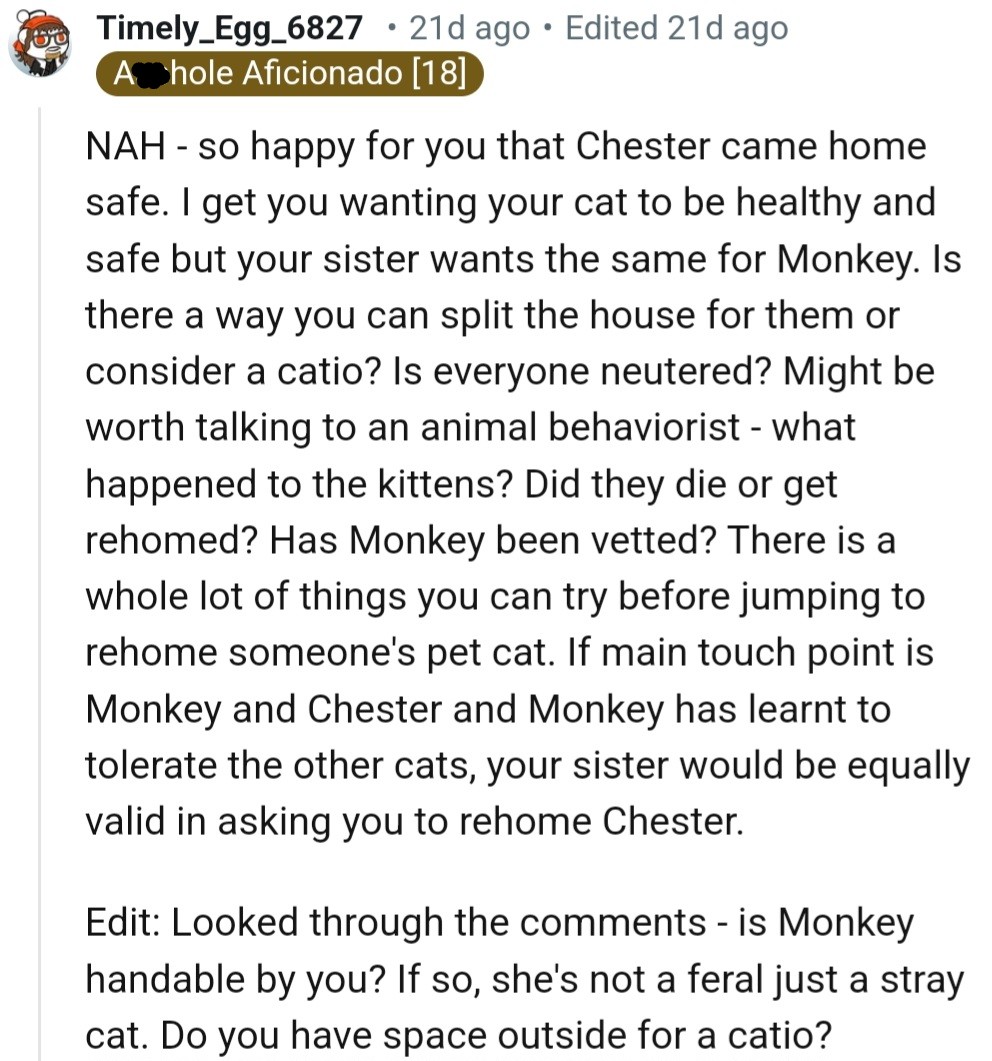Family Demands Rehoming Of Aggressive Rescue Cat After Beloved Pet Goes Missing Following Attack By Feline
When our narrator’s (Original Poster’s) sister brought home a stray kitten, they thought they were saving a life. Little did they know, this tiny furball would turn their peaceful home into a battleground of feline fury.
Monkey was basically a skeleton when OP’s sister stumbled upon her. In addition to being severely underfed, they were shocked to discover she was also pregnant.
Miraculously, they nursed her back to health, and a month later, Monkey gave birth to a litter of kittens—and that’s when the chaos began.
She turned into a little terror and began attacking their other cats. Their sister shrugged it off because “cats fight all the time.” But this was different—there was a full-on war going on in their home: Monkey vs. every other cat.
The real trouble started when Monkey went after Chester—the family darling and OP’s step-grandma's cat. Chester was the epitome of gentleness; a grasshopper once scared him half to death after it jumped too high. That’s how gentle he was.
That fateful day, Monkey pounced on Chester and chased him up a wall. OP managed to intervene, but Chester was so terrified that he hid under the table and refused to come out until Monkey was sent away.
Days later, there was another attack, and this time, Chester disappeared. The family was furious and demanded that OP’s sister get rid of Monkey. She refused, of course—she’d already become too attached.
Thankfully, after a month of worry, Chester returned—and so did the plea to get rid of Monkey. The way OP saw it, Monkey would thrive better in a one-cat home.
Were they the AH for insisting on rehoming Monkey for Chester’s sake?
Let’s dig into the details

Here's the background of the story

Understanding Aggression in Cats
Dr. Emily Thompson, a veterinary behaviorist, indicates that feline aggression can often stem from fear and territorial instincts, especially in rescue animals.
Her research shows that cats who have experienced trauma or instability may display aggressive behaviors as a form of self-defense.
Additionally, studies reveal that rehoming can exacerbate these behaviors if not managed properly, as the cat is placed in an unfamiliar environment where it feels threatened.
OP's gentle cat, Chester, went missing after being attacked twice by Monkey. OP's sister defended Monkey, despite Chester's disappearance, leaving OP worried.

However, OP's cat Chester went missing after being attacked, but he is now safe. OP wants the sister to rehome aggressive Monkey to reduce stress on their pets, but the sister refuses.

Behavioral psychologists emphasize the importance of understanding animal behavior through the lens of attachment theory.
When a pet feels secure and bonded with its owner, it is less likely to exhibit aggression.
In cases like this, fostering a safe emotional environment can significantly reduce anxiety-driven aggression.
OP and sister are helping Monkey with vet visits and family reintroduction. They're also converting their porch into a catio for her safe space.

Check out some interesting comments we've gathered from the Reddit community;

Practical Solutions for Managing Aggression
Implementing gradual desensitization techniques can be beneficial for both the cat and the family involved.
Experts recommend creating a safe space for the cat where it can retreat and feel secure, along with positive reinforcement training to encourage desired behaviors.
Behavioral modification strategies, such as clicker training, can help manage aggression effectively by rewarding calm behavior rather than punishing negative actions.
“It doesn't sound like you properly introduced Monkey to the other cats.”

"Monkey is too stressed out. She sees your other cats as rivals."

Additionally, consulting with a certified animal behaviorist can provide tailored strategies for addressing aggression.
Research in animal behavior suggests that understanding the root causes of aggression is essential for developing an effective management plan.
By focusing on the cat's emotional needs and providing consistent structure, families can foster a more harmonious relationship with their pet.
"If your sister really loves Monkey, she'll want him to not be stressed."

"NAH. Is there a way you can split the house for them or consider a catio?”

With the help and support from the Reddit community, OP was urged to take Monkey to the vet and place her on anxiety medication. The plan to reintroduce her to the other cats was also going extremely well!
The porch was also set to become a catio, so Monkey would soon have ample space to run around and cause all the chaos she wanted.
What do you think about this story? Let us know in the comments.
The Redditor seeks clarification on whether OP has the right to dictate their sister's living situation and pet choices, if OP also has an equally aggressive cat in the home, or if there is a double standard.

"There are too many animals in the home."

The Role of Human Emotion in Pet Behavior
Interestingly, the emotional state of the owner can also impact their pet's behavior.
Studies show that pets are highly attuned to their owners' feelings and stress levels, which can influence their own behavior.
When owners are anxious or agitated, pets may mirror these emotions, leading to increased aggression or anxiety in the animal.
Psychological Analysis
This situation reflects a common challenge faced by families with rescue animals, particularly those with a history of trauma.
Understanding the psychological impact of past experiences on a pet's current behavior is vital for effective intervention and support.
Analysis generated by AI
Analysis & Alternative Approaches
Research from veterinary behavior studies highlights the importance of understanding the emotional dynamics between pets and their owners.
Creating a supportive environment is crucial for rehabilitating aggressive behaviors and fostering a loving bond.
As noted by experts, patience and consistent training can lead to significant improvements in pet behavior, ultimately benefiting both the animal and the family.



